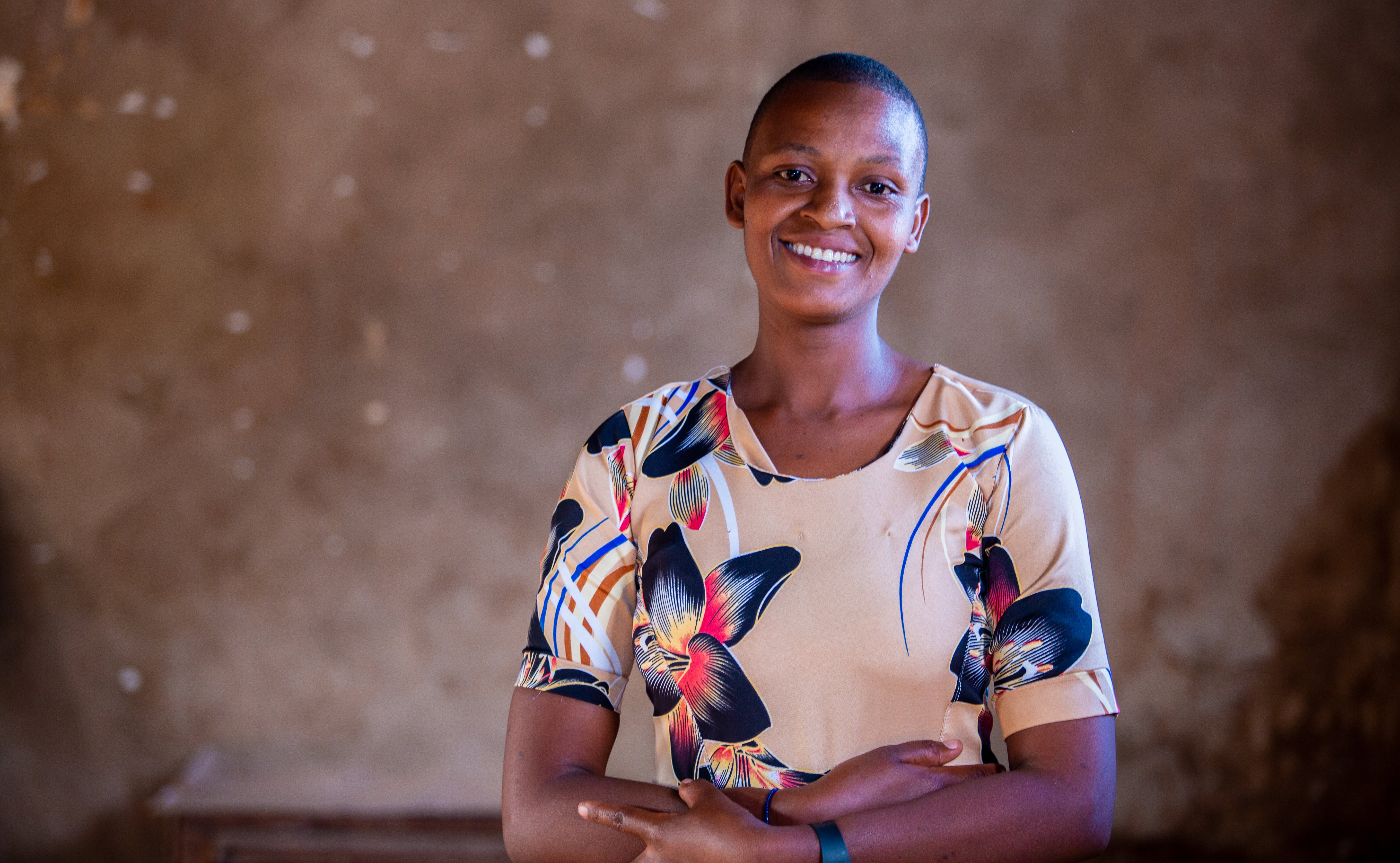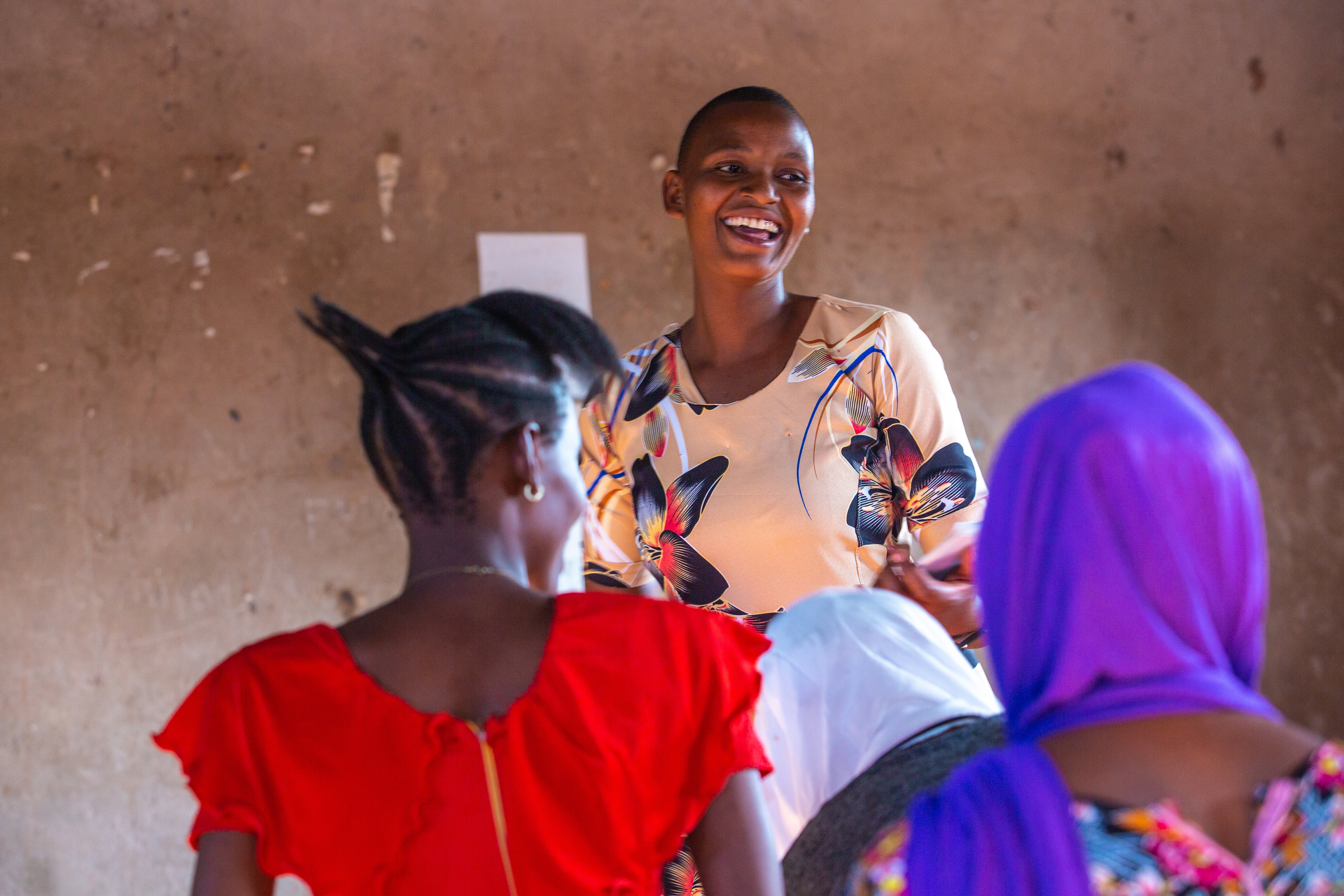Field Stories
Ten inspiring global nutrition stories
December 17, 2024
WP_Term Object
(
[term_id] => 2025
[name] => Stories
[slug] => all-stories
[term_group] => 0
[term_taxonomy_id] => 2025
[taxonomy] => news-category
[description] => Discover the personal stories of people whose lives have been impacted by better nutrition, and those working tirelessly to deliver it, and what’s top of mind for our technical experts as they share the latest on cutting-edge nutrition research, policy updates, and implementation guidance.
[parent] => 0
[count] => 336
[filter] => raw
)
Q&A with a BRIGHT adolescent leader
The Building Rights for Improved Girl's Health in Tanzania (BRIGHT) project builds agency and empowers adolescents to exercise their sexual and reproductive health and nutrition rights. We had the opportunity to sit down with one of BRIGHT’s program participants to hear her experience first-hand.
Posted on October 7, 2024
Nineteen-year-old Tausi is a leader, community volunteer, business owner, small-scale farmer and aspiring nurse. She’s also married and a mom to a three-year-old son and a one-year-old daughter. In 2023, Tausi became involved with the Building Rights for Improved Girl’s Health in Tanzania (BRIGHT) project. She’s using her leadership skills and experience to equip other adolescents with knowledge and access to resources to support their sexual and reproductive health (SRH) and nutrition.
BRIGHT is an integrated adolescent nutrition initiative in Tabora, Tanzania, that uses youth-centered, feminist and rights-based approaches to build agency and empower adolescents (aged 10 to 19) to exercise their SRH and nutrition rights. Funded by Global Affairs Canada, Nutrition International works alongside the Government of Tanzania and in partnership with EngenderHealth and Young and Alive Initiative to implement the project.

“BRIGHT has been life-changing for me. The program trained me on teenage pregnancy, and since I had my first child at 16, I really understand what that’s like,” shares Tausi. “I’ve become a leader for my peers, helping them avoid the same challenges I went through.”
Tausi, who completed Form 4 (Grade 11), facilitates community dialogues where community leaders, healthcare providers, and parents (both male and female) come together to exchange ideas and share knowledge on SHR and nutrition. Once a week, she also meets with adolescent girls who are not in school for peer-to-peer sessions on topics that cover adolescent nutrition, SRH, life skills, gender-based violence, sexually transmitted diseases and family planning.
Read on to discover how Tausi got involved, why she thinks this kind of project is needed, and what she sees for the future.
How did you first hear about the BRIGHT project?
“BRIGHT has empowered adolescent girls, including those who are parents, by improving their awareness of their rights and responsibilities.
I first heard about the BRIGHT project from the Village Executive Officer (VEO). I suspect I was recommended because of my previous involvement in various community activities, especially my work in healthcare and supporting adolescents. Before BRIGHT, I had been volunteering to help children, pregnant women, and people living with HIV/AIDS, ensuring they took their medication, promoting proper nutrition, and encouraging regular clinic visits.
Because of my experience in health and nutrition, and my involvement in administrative tasks with the VEO, I was chosen as a candidate for BRIGHT’s peer programming, where I champion girls’ rights. This role aligns perfectly with my passion for helping adolescents and continuing the work I’ve always loved doing in my community.
Can you describe your involvement?
After receiving training from BRIGHT on nutrition and sexual reproductive health, I prepared a report and shared it with the Village Executive Officer (VEO). Once it was approved, I was able to start building the capacity of other adolescents in my community. From there, I was asked to stay on and support the village office’s department for adolescent sexual reproductive health. In this role, I provide guidance to adolescents aged 10 to 19, especially those who got pregnant at a young age. On clinic days, I help them learn about family planning methods by introducing them to nurses and making sure they feel comfortable talking about their needs.
“But now, thanks to BRIGHT, especially the training on nutrition and sexual reproductive health, I’m in a strong position. When the government begins employing community health workers, I’m confident my community will select me for the role. In fact, I’ve already been recommended by my community for this.
One thing I always emphasize is that to be a good community trainer, you have to have a voluntary spirit. You need to maintain confidentiality and respect people’s privacy, which is essential for building trust.
The training I received has made me much more confident and aware of my own bodily autonomy. I’ve learned about sexually transmitted diseases and have passed that knowledge on to other young people, including my own siblings. I’ve also taught adolescents to be more aware of their surroundings and to take control of their own choices.
What impact has BRIGHT had within your life?
BRIGHT has been life-changing for me. The program trained me on teenage pregnancy, and since I had my first child at 16, I really understand what that’s like. I’ve become a leader for my peers, helping them avoid the same challenges I went through. I often think that if I hadn’t gotten pregnant so young, I would have continued my education, and my life would have been different. But now, thanks to BRIGHT, especially the training on nutrition and sexual reproductive health, I’m in a strong position. When the government begins employing community health workers, I’m confident my community will select me for the role. In fact, I’ve already been recommended by my community for this.
One of the things I’m most proud of is the entrepreneurial skills I’ve gained. Because of these skills, I’ve been able to finish building my two-bedroom house—only the finishing touches are left. I’ve been so inspired by BRIGHT that I’m even thinking of painting the word “BRIGHT” on my house when it’s done.

What’s even more rewarding is seeing how my achievements inspire others. One of the girls I trained has already started making bricks, motivated by the life skills training I gave her. I’ve also started a chicken-rearing project, which has helped me fund my home’s construction.
Why is this project needed?
Projects like BRIGHT are incredibly important, especially in regions like Tabora where underage pregnancies and early marriages are a significant challenge. One of the key benefits of BRIGHT is that it provides crucial training on sexual and reproductive health to both adolescents and parents. If I had received this kind of training before, I likely wouldn’t have gotten pregnant at such a young age. When I first became pregnant, I was scared and unprepared. But now, thanks to BRIGHT, girls who receive this training will understand their sexual and reproductive health rights, and they’ll know more about how their bodies work. Even if they face challenges, they will be better equipped to handle them.
Another benefit is the support it provides to parents. When young girls get pregnant, many are afraid to tell their parents. They hide their pregnancy, which can lead to health issues, including poor nutrition and even miscarriages. Some girls eat things like soil, which offer no nutritional value. They are too scared to reveal their situation. Through BRIGHT’s training, parents have learned how to handle these situations with more care and understanding, which helps protect both the mother and child.
“I now have a clear sense of who I am as a young woman and what I want to achieve. This self-awareness has been the key to my growth.
The BRIGHT project has also addressed gender-based violence, especially economic violence. In the past, many mothers in our community relied entirely on fathers for finances. Mothers couldn’t visit clinics or make decisions about their health without the father’s permission, which put their lives at risk and often led to home births. BRIGHT has empowered adolescent girls, including those who are parents, by improving their awareness of their rights and responsibilities. This training has helped change how families handle these situations, making it easier for girls and women to access the care and support they need.
Can you describe some of the myths, misconceptions or barriers you’ve noticed around SRH and nutrition? How does BRIGHT address this?
One of the main myths I’ve encountered is that people believe violence only means physical harm. Many aren’t aware of other forms of gender-based violence, such as economic or emotional abuse. Through the BRIGHT trainings, we’ve worked to build awareness about these different types of violence, and now I’ve trained people on how to recognize and report these abuses through proper channels.
When I started training people on nutrition, I faced challenges. People would raise concerns, saying they couldn’t afford nutritious food. However, I encouraged them to use what they already have available, like fruits and vegetables they grow themselves, to create a balanced diet. This approach has helped shift the mindset on how to maintain good nutrition without spending extra money.
Additionally, BRIGHT has helped me promote open discussions about sexual and reproductive health, giving adolescents the confidence to express their concerns and seek help. When I’m accompanied by a nurse [during a peer-to-peer session], it gives our lessons on sexual and reproductive health more legitimacy. This has been crucial in closing knowledge gaps and challenging the stigma around these topics.
When you look to the future, how do you think your involvement with this program will help you achieve your goals?
BRIGHT has provided me with training that has increased my confidence and knowledge, particularly in areas like sexual reproductive health and nutrition. Through this training, I’ve been able to educate others about key issues, such as family planning, sexually transmitted diseases, and the importance of proper nutrition for pregnant women and children.
The life skills I’ve gained have helped me understand myself and my purpose. I now have a clear sense of who I am as a young woman and what I want to achieve. This self-awareness has been the key to my growth. It has boosted my confidence, and I can now plan and organize my life with more certainty.
In my dreams, I’ve always envisioned becoming a nurse, and that’s still what I want to pursue.